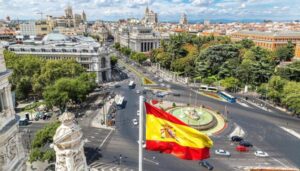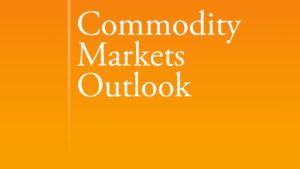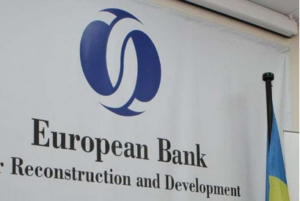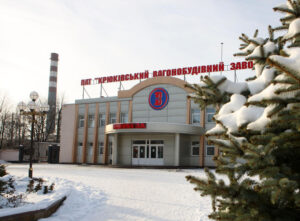
Spain’s GDP grew by 0.6% in the third quarter of 2025 compared to the previous three months, according to preliminary data from the national statistics agency INE. Economic growth compared to the same period last year was 2.8%.
Analysts had forecast an average increase of 0.6% for the first indicator and 3% for the second.
The pace of growth slowed: in the second quarter, GDP rose by 0.8% quarter-on-quarter and 3.1% year-on-year.
Consumer spending in Spain rose by 1.2% in July-September compared to the previous quarter, business investment by 1.7%, and government spending by 1.1%.
Exports of goods and services fell by 0.6%, while imports rose by 1.1%.
Industrial production rose by 0.5%. The services sector showed an increase of 0.8%, and the construction industry also rose by 0.8%.
http://relocation.com.ua/vvp-ispanii-v-iii-kvartali-zris-lyshe-na-06/

Global commodity prices will decline over the next two years amid slowing global economic growth, increasing oil oversupply, and continuing economic policy uncertainty, according to the World Bank’s Commodity Markets Outlook.
The WB’s commodity price index will decline by 7% in both 2025 and 2026, falling to its lowest level since 2020, according to the organization’s experts.
Despite the decline, commodity prices remain above pre-pandemic levels: the WB’s forecasts for 2025 and 2026 suggest that the price index will be 23% and 14% higher than in 2019, respectively.
“The global oil surplus increased significantly in 2025 and is expected to exceed the 2020 peak by 65% next year,” the review says. WB experts note that global oil demand growth is slowing, particularly due to increased demand for electric and hybrid vehicles.
According to the organization’s forecast, the average price of Brent crude oil this year will be $68 per barrel and will fall to a five-year low of $60 per barrel next year. Overall, global energy prices are expected to decline by 12% in 2025 and 10% in 2026.
The World Bank forecasts a 6.1% decline in food prices this year and a 0.3% decline next year.
The review notes that precious metals have risen to record highs this year due to demand for the most reliable assets and continued purchases by global central banks. The price of gold is expected to rise by 42% in 2025 and by another 5% next year, while silver is expected to rise by 34% and 8%, respectively.
“The commodity price index may decline more than expected during the forecast period if global economic growth remains weak amid trade tensions and economic policy uncertainty. An increase in oil production by OPEC+ countries beyond expected volumes could exacerbate the oversupply in the market and lead to a further decline in prices. The sharp growth in electric vehicle sales expected by 2030 could further reduce demand for oil,” the review says.
On the other hand, geopolitical factors could push up oil and precious metal prices, the World Bank warns. Oil prices could also be higher than baseline projections if the market is affected by additional sanctions.

The European Bank for Reconstruction and Development (EBRD) will provide Lviv Bank with an unsecured loan in UAH for up to EUR 40 million and guarantees for EUR 31.5 million to cover the credit risk of new loans to the Ukrainian bank for a total amount equivalent to EUR 45 million.
According to the EBRD website, the Board of Directors approved the relevant projects at a meeting on October 22 this year.
According to the published materials, the loan will be provided in four equal tranches of EUR 10 million each, of which one tranche is currently reserved. It will consist of two components: at least 75% under the EBRD Resilience and Livelihoods Program and up to 25% under the EU4Business-EBRD Credit Line with incentives to finance long-term capital investments of MSMEs.
Funding under the Resilience and Livelihoods program will be used to provide loans to private MSMEs in Ukraine, including those that have relocated their businesses to the western part of Ukraine due to the ongoing war.
As for the guarantee project, unlike most similar projects with larger banks, it will cover 70% of the risk, not 50% as usual. It is noted that the mechanism will include two sublimits with a covered portfolio: EUR 36 million under the Resilience and Livelihoods Guarantee product and EUR 9 million under the EU4Business-EBRD Incentive Credit Line.
The EBRD indicates that Bank Lviv is a regional bank focused on MSMEs operating in western Ukraine with total assets of EUR333 million (0.5% of the market, 23rd out of 60 banks) and a loan portfolio (mainly to MSMEs) of approximately EUR212 million as of the end of the second quarter of 2025 (1.2% of the market). Bank Lviv has its head office in Lviv and 20 branches.

PJSC Kryukovsky Carriage Works (KVSZ, Poltava region) ended January-June 2025 with a loss of UAH 11.7 million, down 6.7% year-on-year.
According to the company’s interim unconsolidated financial statements published in the information disclosure system of the National Securities and Stock Market Commission (NSSMC), net income increased by 24.1% to UAH 1 billion 772.7 million.
During the reporting period, the plant received UAH 34.4 million in losses from operating activities, down 2.4 times, while gross profit quadrupled to UAH 96.3 million.
KVSZ also released its interim reporting for the first quarter of this year, according to which it ended the quarter with a net profit of UAH 3.3 million, down 7.6% year-on-year, with net income up 73% to UAH 1 billion 131 million.
Thus, in the second quarter of this year, its loss decreased by 7% compared to April-June 2014 to almost UAH 15 million, while net income decreased by 17% to UAH 642.2 million.
According to the company’s consolidated financial statements, in the first half of the year, the consolidated loss amounted to UAH 9.8 million, which is 9% less than in the same period last year, and consolidated net income increased by a quarter to UAH 1 billion 785 million.
The company’s reports indicate that in the first quarter of 2025, KVSZ sold 121 freight cars (a total of 474 freight cars were delivered to the market by Ukrainian car builders), while in the second quarter there were no deliveries of freight cars.
“Taking into account the significant surplus of freight cars on the Ukrainian market in the second quarter of 2025, low rental rates, and insufficient cargo base for the existing fleet of cars, PJSC KVSZ did not sell freight cars,” the report says.
At the same time, according to the plant, KVSZ’s competitors sold 131 railcars under previously concluded contracts (including 61 railcars sold to TAS Dneprovagonmash and 70 to DMZ Karpaty).
“Under these agreements, TAS Dneprovagonmash and Karpaty DMZ issued certificates of force majeure with an extension of the delivery time for cars to the third quarter of 2025,” KVSZ reports.
KVSZ notes that the Ukrainian freight car market experienced a steady and significant surplus in the second quarter.
“And the export market is experiencing a decrease in demand and a slowdown in development due to the lack of fleet renewal programs and the write-off of worn-out rolling stock,” the report says.
At the same time, KVSZ reminds that in the first half of the year it continued to supply passenger cars to Ukrzaliznytsia under a contract for 66 cars signed in 2023, including 17 cars in the first quarter and 16 cars in the second quarter.
The share of exports in the second quarter amounted to 0.6% of sales, which included railway transport spare parts for Latvia.
“Given the high development of the railway rolling stock industry in the EU, competition there is considered extremely high. Traditional European manufacturers have been joined by new ones from Turkey and Bulgaria, which offer low prices for their products due to a significant share of in-house production of components (primarily bogies), proximity to rolled metal suppliers, and lower operating costs (compared to Western Europe),” the company said in its report.
KVSZ produces passenger and freight railcars, regional diesel trains, high-speed interregional locomotive trains, spare parts and bogies for freight cars.
In 2024, the plant sold 1,096 thousand freight cars, which is almost 10% more than in pre-war 2021. The first 15 passenger railcars were also delivered to Ukrzaliznytsia under contracts for 66 units. Net profit amounted to UAH 81.08 million, compared to a loss of UAH 143.76 million in 2023.

According to Serbian Economist, the Serbian government will allocate €10.6 million in subsidies to Lafarge Beočin, part of the Holcim group, for the construction of a new cement production and distribution plant in Obrenovac, according to the Serbian Ministry of Economy.
According to an agreement between Economy Minister Andrijana Mesarovic and Lafarge Director Dimitrij Knegić, the company will invest €112.25 million in the project and create 51 permanent jobs by the end of 2026.
Lafarge has committed to paying new employees a salary at least 20% above the minimum wage and to maintaining a total workforce of at least 320 people for five years after the project’s completion.
The subsidies will be paid in three stages — in 2026, 2027, and 2028.
Lafarge Beočin, founded in 1839, is one of the largest cement producers in Serbia and is part of the international Holcim group. The plant in Beočin is the oldest cement plant in the Balkans, with a production capacity of over 2 million tons of cement per year.
According to data from the Statistical Office of Serbia, the country’s annual cement production is around 2.5-2.8 million tons, of which more than 70% is accounted for by Holcim / Lafarge.

The volume of freight transportation in January-September 2025 amounted to 238.7 million tons, which is 9.7% less than in the same period of 2024, while in January-August it was 11.3%, and 12.6% in January-July, according to the State Statistics Service (SSS) website.
According to its data, rail transport remains the leader in terms of freight volume, with 120.6 million tons, which is 8.6% less than in the same period last year.
Rail freight turnover for the reporting period amounted to 75.56 billion tons/km, which is 11.6% less than for the same period in 2024.
Road transport carried 90.6 million tons of cargo in the first nine months of this year, which is 6.2% less than in the first nine months of 2024.
Cargo transportation by water transport in January-September 2025 amounted to 0.7 million tons, or 56.3% of the volume in January-August 2024.
As reported, freight traffic in 2024 increased by 7.8%, and freight turnover by 13%, to 184.58 billion tons/km.
At the beginning of this year, the decline in freight traffic in Ukraine accelerated and reached 18.5% in the first four months, including a 21.3% decline in rail transport, but since then the decline has been slowing down every month.